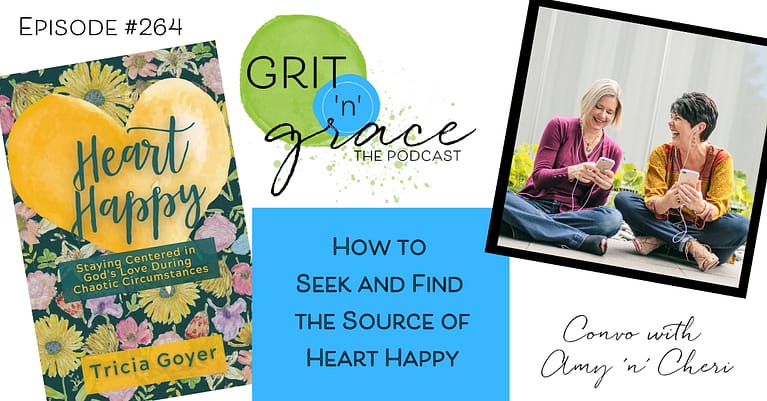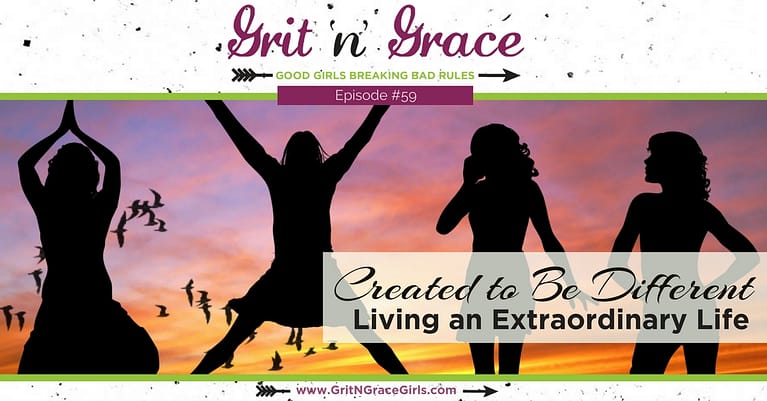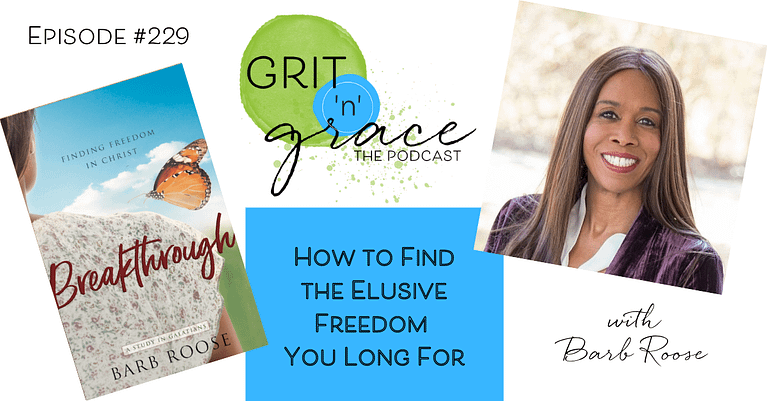
We’re all a mix of good and bad. Virtue and vice. This truth can leave us striving to fix ourselves and feeling like a failure when we fall short. Amy and Cheri discuss how we can tell the difference between the way God has made us and the unhealthy ways we’ve developed. Listen in to find freedom from the angst that picking yourself apart can bring!
(This page contains affiliate links. Your clicks and purchases help support Grit 'n' Grace at no extra charge to you.)
Recommended Resources
Downloads
- Episode #185 Digging Deeper Devotional — coming soon!
Your Turn
- What parts of yourself do you struggle with the most?
- How have you coped trying to fix those things in your own strength?
- How might it change things for you if you trust Jesus to be your gentle change agent?
Transcript — scroll to read here (or download above)
****
Grit ‘n’ Grace: Good Girls Breaking Bad Rules
Episode #185: What to Do with the Parts of You that You Don’t Like
Cheri:
Alright.
So Amy, tell us about your trip to Hawaii!
Amy:
Well, am I allowed to gush?
Cheri:
Yes, please gush.
Amy:
I mean. I just need to gush. Well, the reason, of course that we went – Barry went with me – is that we got an invitation from One Love Ministries to speak, and – so excited to be part of their retreat. Can we just give a shout out to Karen Haddock?
Cheri:
Woot woot!
Amy:
Honestly, one of the best women’s ministry leaders I’ve ever seen in action. Part of the pleasure of the trip was watching her in action.
Cheri:
Yeah.
Amy:
It was amazing. Such a wonderful retreat, and you know, it just doesn’t hurt that you’re doing it in this open air, kind of, pavilion with the breeze blowing through and palm trees swaying. It’s just –
Cheri:
And you can hear the surf just in the, in the ever-so-slight distance.
Amy:
Yes. Oh, my heavens. Well, it is paradise, isn’t it? You went last year.
Cheri:
I went last year. Now, we had rain when I was there; it was, it was rainstorms, and then it was sunny and then it was rainstorms and then it was sunny. So my umbrella kept coming out and back and out and back. You could, you could tell I was the mainlander cause I had an umbrella.
Amy:
That’s so funny. Well, yeah, we had a little bit of that over the weekend, but Barry and I went five days before. Oh my goodness. And it was the most perfect weather – and it is the weather that you see on TV. So I just thought that was the norm.
I was told the week before we were there that it was cold and rainy and I was like, well, that would not have suited my Magnum PI, uh, vision of Hawaii.
Cheri:
Well, I am so glad that Hawaii lived up to your expectations. We won’t discuss whether they were perfectionistic expectations or not.
<Laughter>
Amy:
They probably were, but, oh my gosh. Hawaii exceeded them. So that was, that was amazing.
Cheri:
Very cool. So, okay. So then we have to acknowledge that there was a bit of disappointment associated with the trip, because I was supposed to go,
Amy:
Yes.
Cheri:
We were going to give an Exhale retreat together, and earlier in January I just got the sense that I needed to remove some things from my calendar and I thought I was being super duper responsible, which is not one of my strength-finder strengths, by the way.
Like, you’re mad on responsibility; it’s like, I don’t know number 33 out of 34 for me. But, while you were gone, Daniel got really, really sick and spiked a 102.5 fever suddenly. And so, it was another one of those times, one of those few times I’m going to say, where I got to understand why I was where I was.
And it took away a bit of the sting of the disappointment of not going to Hawaii. Let’s be clear, there is still a part of me that is aware I was not in Hawaii with you, but there was a reason. And I know that you represented Grit’n’Grace and Exhale, and you said Barry even ate with the women.
Amy:
He did. And in fact, you know, Barry is one of these funny men. He, I told him one time, he didn’t know how to take it – I said, “You are the closest I could have ever gotten to marrying a girl.”
[Laughter]
Cheri:
Yeah, I’m not sure that’s high on a man’s list of compliments he’s seeking.
Amy:
But it was a high compliment for me because Barry actually loves women. Not in a weird way, but he just highly esteems and enjoys women.
Cheri:
He’s very brotherly.
Amy:
He is. And he likes to talk to women. And so like after one of my sessions I came out and he had been having seriously like a counseling session almost with a mother and daughter. So it wasn’t an inappropriate thing, but it was, I was like, wow. So God even used Barry there, too. And it was just a sweet thing. Yeah, it was sweet.
Oh, and he got to light the fire, so he got to do a manly thing. They were like, “Would Barry light the fire?” So, I was sitting in – they were doing small groups. I have to tell you this, it is just so funny, so manly, to counterpoint to “I almost married a girl.”
[Laughter]
Cheri:
Yeah, let’s balance that out real quick, Amy.
Amy:
So, they had asked him to light the fire and I get this text and it says, “Big fire, big, big fire.” I turned around and, literally the fire, it looks like it’s reaching the sky.
[Cheri laughs]
Amy:
I thought, “We’re going to burn down the camp!” But, they had given him lighter fluid, so what does a guy do, you know?
Cheri:
Well, this is Cheri Gregory.
Amy:
And I’m Amy Carroll.
Cheri:
And you’re listening to Grit’n’Grace: Good Girls Breaking Bad Rules. The podcast that equips you to lose who you’re not, love who you are, and live your one life well.
Amy:
Today we’re talking about an excellent question that one of our listeners sent to us. She said, “How do you discern what parts of you are God-given and should be embraced versus what parts have been formed by the way you were raised, the pain you’ve experienced, et cetera. There are so many parts of me that I find unattractive that need to be fixed and I get overwhelmed thinking about all the improving I have to do.”
Cheri:
Wow. You know, this question came in and, first of all, I would just wanted to hug her. And I also wanted to cheer and thank her, because this is such a gut, honest question. I can just imagine right now our listeners nodding and some of them are like raising their hands and saying, “That’s me. That’s me. I so get it.”
And I really just love how she put this into words. And I was thinking – how many times do we feel this way? And we end up being motivated to either act or not act, but we don’t recognize it. Like, there’s such a gift of putting this question, this series of questions into words.
So, what we’re going to do in this episode is we’re going to actually break it down. We’re going to take it in a slightly different order. And so the first question – I’m going to let you address it first – is, well, it’s, it’s actually the statement. “There are many parts of me that I find unattractive that need to be fixed.” You ever felt that way, Amy?
[Amy laughs]
Cheri:
Once or twice?
Amy:
All the time. And listen, I know our listeners might be sick of Enneagram talk, but I have to weave some of it in today because I’m a 1, which is a perfectionist.
And so, all I can see sometimes are the unattractive parts of myself. So I was thinking about, well, what are they? It was very easy to make this list.
So I said, well, I tend to lean toward the negative. That’s my knee-jerk reaction is to see things negatively. I can be a complainer, to be real honest. I don’t notice other people’s needs, which is disconcerting to me cause I really do love people.
And, like, after the fact sometimes I’m like, how did I miss that? But yeah. And then my big thing is I’m always, always, always fighting not to overtalk in situations. So those are just a few of my unattractive traits.
How about you Cheri? Do you have one or two?
Cheri:
Oh, Oh, well, yeah. No, no, I’m, you know, no, no, no.
Yeah, I don’t know what you’re talking about.
Oh my goodness. Well, here’s the thing is not only do I have my, my list and, and so much of it has to do with feeling like I’m too clingy, feeling like I need too much from people that I expect too much from people.
But, of course, as a people pleaser/meddler I hide my neediness in helpfulness because that’s the Christian way of doing things, you know? I mean, how could it possibly be negative if it shows up as helpfulness/manipulativeness? [clears throat]
But here’s the other thing that, that for me, it makes it even worse is I’m about to turn 50 – I don’t know – what year is it? Is this 2020? I’m about to turn 53.
You know, somewhere in here I keep thinking I’m going to finally arrive. I’m going to leave all of this stuff behind. It’s all going to be a thing of the past. It’s not going to be an issue anymore.
And I don’t even know if it’s so much that I’m going to achieve perfection. I just, I want to be less aware of it. I want to be doing the negative stuff less and feeling like I’m making a ton more progress. Like, I want to be aware. I want my days to be filled with my awareness of my own progress.
[Laughter]
Oops, that sounds a little on the selfish side, too. But here’s the thing I think we’re both keenly aware of in that is that humans do tend to have a negativity bias. Like, this is just, we know this as humans, and I think it’s especially true of those that this podcast is for, those of us who are reforming perfectionists, those of us who are reforming people pleasers, and those of us who are highly sensitive persons.
We just, we are even more aware of the negative than say your average Enneagram 7 who is just filled with positivity. So, I think this really is a very particular struggle that awareness of things that are unattractive and that awareness of everything needs to be fixed.
Amy:
Absolutely. Somebody recently gave, I read it someplace, a visual of this negativity bias that our brains with negative things are like Velcro and with positive things they are like Teflon.
Cheri:
What a great metaphor.
Amy:
Yeah. And I thought that really helps me to envision this, what our brains naturally do. And so, we have to fight that.
Cheri:
Mmmhmm. That is – I love that. I love that, because that metaphor says there’s something that we can do about it.
Amy:
One other thing that she said, one other thing she said is “I get overwhelmed thinking of all the improving that I have to do.”
Cheri:
Well, what jumps out at me here – it’s not the word overwhelmed. Even though I did coauthor a book by the name Overwhelmed.
But what really jumped out to me here, and I really resonated with, is that phrase I have to do all the improving. I have to do. And again, I’m betting our listeners are sitting there just nodding along with that sense of it’s all up to me.
It’s probably my fault, which means I have to fix it somehow. And let me tell you, this just brings back so many memories of all the decades of self-improvement plans and let’s just be clear failed self-improvement plans.
Amy:
Yes, absolutely. And I mean I’ve done the same thing and felt the same way. There’s been so much striving in my life.
But I want to share one little point that I shared in Hawaii, which, I was looking at Colossians 1 and Colossians 1 says that all things were created in Jesus and for Jesus. And so, I said, whereas we think we have to be all the things, Jesus is actually all the things, all things are created in Him and for Him.
Isn’t that a relief? That we can cease striving and rest because Jesus is all the things, so we are not.
That’s a place to rest. But it’s been hard. You and I have talked about this, this need for a savior, it should be easy, right? A no-brainer. Like, wow, we don’t have to do it all! Great!
And yet we keep striving. And that’s one of the things I’m trying to put a stop to in my life is all the angst, all the striving,
Cheri:
You know, and just as you were talking, I could just feel the knot in my stomach start to loosen and my shoulders went from being close to my ears to, you know, releasing back down to where they need to be.
And what a beautiful – first of all, what a beautiful reminder. Thank you. Thank you. Thank you.
And, you know, we need to keep coming back to this. For those of us who do have that incredibly strong negativity bias, to be reminded, we need to keep coming back to this.
I’ve been using an app for the last couple of months. It’s called the Pause app, and it’s from John Eldridge.
You can do the one minute version. You have to graduate, you have to do the one minute pause for several times and then work your way up to the three minute pause and then work your way up to the five minute pause.
And I thought there’s no way I’m going to be able to get up to the five minute pause. But it’s just a series of scriptures. And at one point he asks, “What do I need to let go of right now?”
And that has been so helpful. And my phone reminds me twice a day, but sometimes I’ll just pick it up and I’ll go ahead and do it when I feel myself becoming overwhelmed either because of something that I feel like, oh my goodness, I messed up again. Why am I not further along in this area?
Or somebody else has messed up, which, of course, I take on because if I’m in relationship with them, of course, what they do, quote unquote “wrong” is my fault. Right? As a good, recovering, codependent.
And so, to recognize that negative thinking as a time I need to pause and put myself in an intentional place to surrender. And part of me is like, “I shouldn’t need an app. I should be able to do this by myself.”
But, you know, the thing about almost turning 53 is I’m like, you know what, if I need tools, if I need quote unquote “crutches.” if I need something else to help guide me, it’s a gift. So that’s how I’ve been seeing this app.
Amy:
Beautifully said.
Cheri:
How do you discern what parts had been formed by the way you were raised, the pain you’ve experienced, et cetera?
Amy:
Well, I just want to say here that this is such a legitimate question. I just want to affirm that this is a great question. Ourfriend, Susie Eller, says
Cheri:
Woot! Susie!
Amy:
So amazing! She says that we need to visit the past as a student, not a resident. Don’t you love that?
Cheri:
That is so good!
Amy:
Yeah. So good.
Like, we don’t want to live there, but, on the other hand, wise people visit their past as a student to learn from it.
Cheri:
Learn there; not live there. I love that.
Amy:
Oh good! Hey, alliteration. We love it.
Alright. So, for those of us who may not have trauma, big trauma, in our past we still do this, right?
And I think some of the ways that we do this is we journal, we think, you know, we live the examined life that you and I’ve talked about so much.
For me, that’s been some Enneagram work. Honestly, Beth McCord’s books are just like blowing my doors off, and I’m seeing some things about my past that have shaped my present that need to be dealt with. So, not big horrific things, but still, things!
And then for those people who has some significant trauma and family situations, you know, your life is, is, is difficult in ways it doesn’t need to be difficult.
Christian counseling, can we just say, Christian counseling? Our family has gone to Christian counselors several times with our kids when we just hit a wall where like we’ve tried everything we know to try, and, and so I’m a big, big believer in Christian counseling.
And if today you are listening and you think, “I do need a counselor. I need somebody to help me. I don’t know what else to do.” Focus on the Family has a great counseling referral service.
Cheri:
That’s wonderful.
And, you know, let me just join in and say not only Christian counseling, but if you start with one, and you give it a good shot, several sessions, and it’s just not a good match; and this is so hard, like, it’s hard enough to go to somebody and start spilling your guts, but then, if you realize, okay, I’m being as cooperative as I can, but this just doesn’t feel like a fit for me.
There’ve been times, seasons in my life, where I’ve had to try several before finding one where I’m like, yes, this is a good fit. And that was hard because I thought, well, if I was really dedicated, then I would make it work with the first one. So, Christian counseling, and sometimes you have to interview several to find a good match.
So speaking of trauma, I’ve been reading a book called It Didn’t Start With You, and it’s about inherited family trauma. And it was amazing because in the first chapter, as it sets up the whole concept, it actually ends with a whole page. Now, this is a secular book, completely secular book. But the very last page of that first chapter, he actually quotes the scripture about consequences landing on the children unto the third and fourth generation.
And I just thought that was so fascinating, because as I was reading that chapter, that scripture kept coming to mind. And I’ve always thought, you know, this is not God cursing or being cruel. He’s just saying the way that he created us. He knows our genetics.
And this is something where scientists have now discovered something called epigenetics, where we used to think, well, it didn’t happen to you so it shouldn’t affect you. And now what we’re finding, and they’ve studied Holocaust survivors that actually the children and grandchildren have some of the same PTSD, because there were genes that were flipped on by their ancestors.
They weren’t in the concentration camps. They didn’t experience the starvation. They didn’t experience the same horrors. And it’s more than just having heard some of the family stories.
It’s actually that the genetic expression has actually been altered. And so, there’s something kind of horrifying about that. But there’s something very freeing about that to realize, hang on, I might actually be reacting to things in my present life that didn’t actually happen to me. But there is some literal baggage that’s been handed down from previous generations.
Amy:
Wow!
Cheri:
And one of the things I did was I drew out a genogram, with multiple generations, to see what events might have flipped some epigenetic switches and by my parents, my grandparents, and even great-grandparents. And, you know, one of the things that just jumped out at me is the number of women who had to make a choice to sacrifice themselves for their family members.
Like, my great-great-grandmother literally ran into a burning building and died so that her children would not be discovered in the midst of the Armenian genocide. And so, what I thought was just an amazing family story of heroism.
I’m now realizing that pattern of sacrificing, you know, such a humongous sacrifice may actually be part of my unconscious everyday life and maybe part of some of the unhealthy people pleasing, meddling, manipulation, that kind of stuff that I do now. And so, the way that this is helpful for me is first of all to realize it didn’t start with me. That’s the title of the book. Like, I’m not making this up. It’s not all my fault.
And so, for some of this, God is leading me through a journey of really very active pray-cessing and healing. So, that event I know about. And so, I’ve been able to just process and think to myself and, and really ask God to reveal, okay, what are some ways in which I am unnecessarily sacrificing?
Like, I’m not in the middle of the genocide right now. I don’t need to be saving my children and rescuing my children.
This is an instinct I have to pull the reigns back on. And then there’s other areas in which, like, I’m not going to spend my life trying to find all the trauma in my family. I’m not going to go try to ask every single person to try to explain every single thing in my life.
And so. those are the areas that are a journey of surrender where I say, okay, there’s something here that goes back that’s bigger than me, and I’m going to hand it over to the God who’s bigger than me, who’s going to help me handle it.
Amy:
That’s all mind blowing and profound. Really.
I think that will be so helpful to somebody who’s listening today. So the final part of the question was how do you discern what parts of you are God-given and should be embraced?
Cheri:
Well, I’m going to share my dad’s advice that he gave me when I was either 12 or 13, and we were talking about how do you know if God has called you?
And I was very worried back then about making the right choice of how to follow God and how to serve Him. And so, the first thing he said was, you ask the question, “Am I good at it?” And that was a good question.
At that stage of my life, that was a hard question because there were quite a few things I felt like I was good at. I also worried that that acknowledging that was pride, but it was a conversation between him and me. So that felt kind of safe.
He said the second thing was “Do others affirm it?” And so that kind of cut my list down. There were some things I was good at, but they didn’t seem to, what’s the older term? Edify the body of Christ. They didn’t really seem to make a contribution.
And the last one is the one that should have been my favorite, but it’s the one I fought the hardest and he said, “Does it bring me joy?”
And that one feels still too good to be true. Like how dare I enjoy myself when I’m serving God? Like, surely it ought to feel really, really hard or it should wear me out.
Those should be the litmus test for is this a God-given part of me? And so, that that last one of looking for the things that I’m good at, others affirm, and that also bring me a sense of joy or at least satisfaction. That sense that of well done, good and faithful servant.
How about you? How do you discern what parts are God-given and should be embraced?
Amy:
Well, and as I thought through this this morning, I was laboring over this, thinking through this, and coming up with lists for this. And then the simplest is, kind of, Occam’s Razor – the simplest answer is the most obvious answer and the truest answer, which is just ask God.
Just ask God to show you where he delights in you, where he finds pleasure in you because he created you that way.
And even saying that out loud brings tears to my eyes because this whole idea of God delighting in us, taking pleasure in us, is just so foreign to me. Why is it still so foreign to me?
I sat at our friend Debbie Wilson’s book launch yesterday and listened to her talk about the love of God, and, oh my goodness, again, I was just moved to tears. And, you know, it’s the simplest answer. And I think if we’ll sit in the silence after asking God that question, “What do I need to embrace in me because you put it in me? What do you delight in? What do you take pleasure in?” That we’ll be blown away.
And that’s where we stop striving, and we rest, and we trust our Creator that God don’t make no junk. You know. [Laughter] He made us, as people have said, with a purpose and for a purpose.
Cheri:
Mmm, I love that.
Alright, so what scripture have you chosen? What scripture have you chosen for this episode?
Amy:
Well, it’s a very familiar one. It’s from Psalm 139, the first part of verse 14. “I praise You, because I’m fearfully and wonderfully made.”
And, you know, one of the things that that God has shown me as I was looking at this is if, if David had said, I am fearfully and wonderfully made, full stop.
That’s hubris. It’s arrogance. It’s pride. It’s also kind of our culture, self-love philosophy.
But those three words at the beginning change everything. I praise You. That loving ourselves, that embracing the parts of us that God made in us that are good. That is an act of worship.
Cheri:
Oh I love that. So what you’re saying is is when we really embrace these parts of us, it’s not, I praise myself.
It starts with I praise You. That does. That absolutely changes everything. This is not self praise. This is praising God – I love that.
Alright, so what’s the bad rule that we are breaking in this episode?
Amy:
Well, I think both of us could relate to the person that asks this question so much. And the thing that you and I have done over our lifetimes that we’re now changing, but the bad rule is I must search out the parts of me to change.
And you hear the striving in that. And the angst in that and the putting all the responsibility on ourselves.
Cheri:
I’m tearing up both at the recognition that this is how I’ve spent 53 years and also at the thought of not doing it. I’m like, wow, what would it be like to not work that hard? I love it.
So what’s the truth? What’s the fact to focus on instead?
Amy:
Jesus is our gentle change agent.
It’s not that we don’t need change. We need to say this, again, because we know the haters are gonna hate and say, well, you know, this whole embracing all your imperfections is crazy.
It’s not that. We do need to change. God wants do a perfecting work and us, but it’s not about us doing it. It is a supernatural action of the Holy Spirit that we surrender to. And that we participate with.
Cheri:
Mmm, absolutely.
So what do you find being the grit in all of this?
Amy:
It is hard for me to change that bad habit of striving. It’s really hard.
So one of the things that I have to be aware of is when I switch into that striving mode that I want to be on high alert.
It’s going to take me grit to be on high alert against striving, and I want to flip from striving to serenity, which is just, that’s word, serenity. Oh, my word. What would that be like?
I’m not there yet, but I’m getting there. I have moments of it, more than I used to. I think it’s a rest and a surrender.
Cheri:
Ahh, I love that. So when you find yourself striving, that’s a signal that what you need to switch to is serenity.
Amy:
Yes.
Cheri:
Thank you for casting that vision for all of us.
I think for me, the grace in all of this goes back to her point of seeing all these parts that are unattractive, that need to be fixed, and getting overwhelmed thinking of all the improving I have to do.
And so, for me, the grace is that when God lets me know that there is something that we need to work on together, by which, of course, it’s, He’s doing the work. I’m cooperating with it, because it’s his transforming work of restoring me to who He created me to be.
My experience is that He never overwhelms. He doesn’t come with a laundry list, and He is so gracious in saying, “Let’s work on this one thing today.”
Amy:
Yes.
Cheri:
And I’m going to bring it up several times, and we’re going to talk about it, and I’m going to walk alongside you. And, you’re going to hang out with me and learn to be more like Me. And as you grow in this area, you’re going to be less and less thinking of you and aware of you, and more and more aware of Me and more like Me.”
And at some point, you’ll forget about it and it won’t involve striving. In fact, now that I’m saying all this aloud, it sounds an awful lot like serenity.
That God doesn’t give us the laundry list. He comes to us with one thing at a time, and He transforms our lives into lives of that serenity.
Amy:
Yes.
Cheri:
We hope you’ve enjoyed episode 185 of Grit’n’Grace: Good Girls Breaking Bad Rules.
Amy:
Hop on over to our website, gritngracegirls.com/epiosde185. There you’ll find this week’s transcript and our digging deeper devotional.
Cheri:
Alright. Amy, we are just like a week or two away from something we had been planning for years! Years! And it’s about to happen! Remind our listeners what it is.
Amy:
On March the second, Monday, March 2nd, the Exhale online book study will begin, and we are beyond excited about being in a group with all of you that want to join us. Interacting, learning from each other, talking back and forth. All the good things.
Cheri:
You know what I’m most excited about?
Amy:
Tell.
Cheri:
Well, okay, the thing I’m most excited about is hanging out with you some more and hanging out with our listeners and our readers.
Okay, so, let’s, let me put other people first.
[Laughter]
I have to remember to do that. Okay, so that’s what I’m most excited about.
Second, most excited is I haven’t read through Exhale for a little while, and you know what it’s like as an author. You write it, and you’d think that after working that hard on it, you’d like remember every single word in it.
But I know from experience that I’m going to go back, I’m going to reread it, and there’s going to be parts that are going to jump out as if they’re completely brand new.
And, I also know that God is going to bring new insights, like new layers of insight to things that we wrote however long it was ago.
So, I’m really, really excited about being reminded of things that I need to be reminded of. But then also some of those new insights.
And so, those who join us in this Exhale online book study will be there for some of these new and exciting discoveries that we’re going to make together.
And then, of course, the input from everybody else in the group.
So, how can our listeners join us?
Amy:
Well, what you should know is that the podcast is going to go silent for a bit, because we’re putting all our time, energy, and efforts into the online study.
So join us there! We don’t want you to miss out on anything.
You need to take two steps: get a copy of Exhale. You can get a paperback copy, you can get a digital copy, or you can get the audio book. They’re all available.
And, you need to join our private Facebook group, which is Exhale Online Book Study.
Cheri:
So the Grit’n’Grace podcast will go silent for the month of March and the first half of April. So, if you want to hear our charming voices, especially Amy’s sweet, Southern drawl, that’s where we’ll be.
Amy:
Join us next week when we’ll be talking about the beauty of growth in a small group.
Cheri:
For today, grow your grit. Embrace God’s grace. And when you run across a bad rule, you know what to do. Go right on ahead and…
Amy ‘n’ Cheri:
Break it!
Outtakes
Cheri:
Can you just say the word backslash again?
Amy:
Backslash.
Cheri:
I don’t know why we got a pop on that.
Amy:
Well, I usually say it and it sounds like back splash. I’m trying.
[Laughter}
Cheri:
I love it.
Alright. Amy, we are just like a week or two away from something we had been planning for years! Years!
[Laughter]
You’ll never miss an episode when you sign up for weekly updates!










Episode #185 was spot-on beautiful. Thank you, ladies!